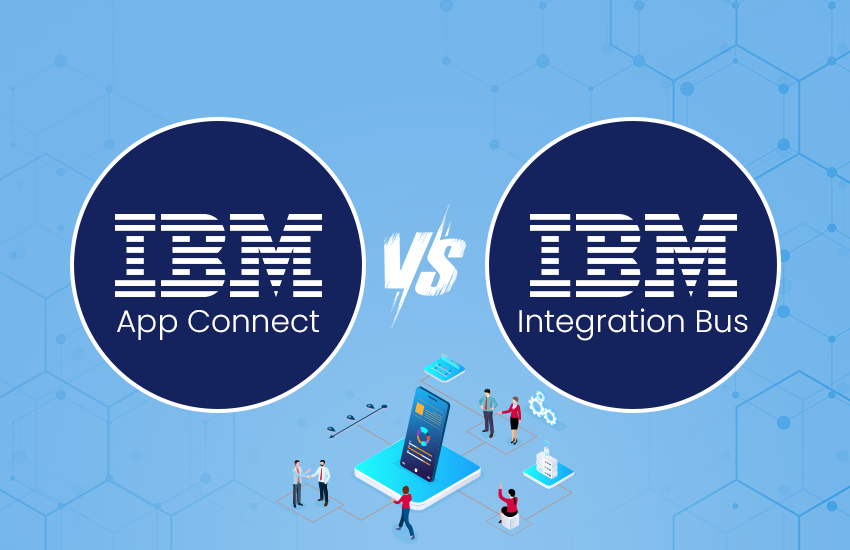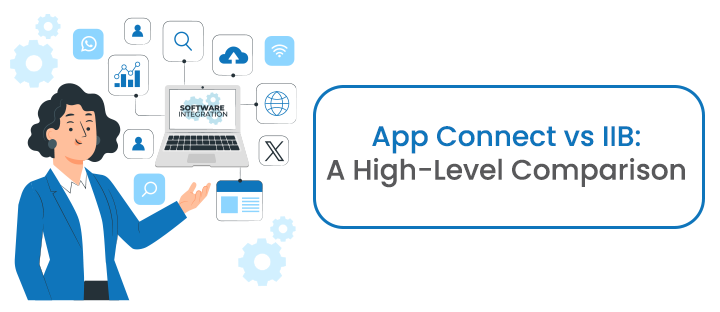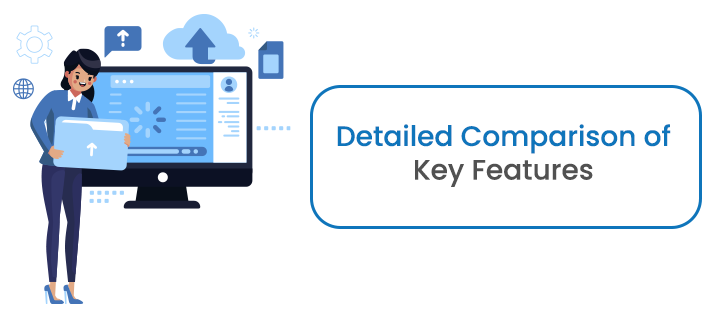
Difference Between IIB vs App Connect Enterprise
When it comes to connecting different applications and data across business environments, IBM provides powerful solutions designed for various requirements. This article explores the differences between IBM App Connect and IBM Integration Bus (IIB), outlining their features, suitable use cases, and key distinctions. The goal is to assist organizations in choosing the right tool for their integration needs.
Introduction
In today’s digital world, smoothly connecting different applications and services is vital for businesses to stay efficient and competitive. IBM offers two strong tools for this purpose: IBM App Connect and IBM Integration Bus (IIB). Both tools help businesses integrate their systems but have different strengths and features.
IBM App Connect: This Application integration software is known for its easy-to-use interface and quick setup, allowing businesses to connect applications and automate tasks efficiently.
IBM Integration Bus (IIB): This solution is praised for its ability to manage more complex integrations and large-scale processes, making it a top choice for enterprise-level systems.
Each tool has its own benefits, depending on the business's needs. IBM App Connect is great for fast, simple integrations, while IIB shines when dealing with more complex and large-scale tasks.
App Connect vs. IIB: A High-Level Comparison

IBM App Connect and IBM Integration Bus (IIB) are two effective integration solution for managing integrations, each designed for different needs. IBM App Connect is a cloud-based application integration platform that makes it easy to connect applications and data sources. It’s great for businesses that want to set up integrations quickly without a lot of coding, making it user-friendly for those without a technical background.
On the other hand, IIB (also known as IBM App Connect Enterprise) offers more advanced features, making it perfect for complex integrations, including those involving legacy systems.
Choosing between these application integration platforms often depends on how complex the integration is and the technical skills available. IBM App Connect is a good fit for simpler integrations that need to be done quickly, while IIB is better for more detailed scenarios that require a lot of customization and control.
Detailed Comparison of Key Features

IBM App Connect and IBM Integration Bus (IIB) are both strong application integration tools but are designed for different needs. IBM App Connect focuses on quick and easy integration, making it suitable for both business users and developers. IIB, on the other hand, is built for handling more advanced, complex integrations at an enterprise level.
- User Interface: IBM App Connect offers a simple, graphical interface that makes creating integrations easier. IIB provides a more detailed environment, which is better suited for experienced developers.
- Integration Capabilities: Both tools support various integration patterns, but IIB stands out in managing complex, high-volume tasks. IBM App Connect works well for simpler, cloud-based integrations.
- Scalability: IIB is designed for large-scale, enterprise-level integrations with strong reliability and performance. IBM App Connect also scales but focuses more on quick, agile deployments.
- API Management: IBM App Connect works smoothly with services like ApiX-Drive, making API management easy. While IIB also supports API integration, it requires more configuration.
In conclusion, IBM App Connect is best for fast, easy-to-use integrations, while IIB excels in managing complex, large-scale tasks. Your choice depends on the complexity and scale of your integration needs.
Use Cases and Suitability
IBM App Connect is ideal for organizations needing a flexible solution to connect various applications, data, and systems efficiently. It is especially helpful for businesses aiming to automate workflows and improve productivity by integrating cloud services with on-premises applications.
On the other hand, IBM Integration Bus (IIB) is best suited for larger enterprises that require a powerful and scalable platform to manage complex integration tasks. IIB performs exceptionally well in environments where handling large volumes of data and enterprise-level integrations are essential.
- IBM App Connect: Best for small to medium-sized businesses looking for quick and easy integrations.
- IBM Integration Bus: Ideal for large enterprises with complex integration needs and high transaction volumes.
The choice between IBM App Connect and IIB depends on your business's specific needs. For simpler integrations, IBM App Connect is a great fit, while IBM Integration Bus is the better choice for more complex and demanding integration tasks.
Difference Between IIB vs App Connect Enterprise
|
Feature |
IBM Integration Bus (IIB) V10 |
IBM App Connect Enterprise (ACE) V11 |
|
Migration Support |
Basic support |
Enhanced migration features |
|
Configuration of Integration Nodes, Servers, and Resources |
Standard configuration |
Improved and simplified configuration |
|
Policy Enhancements |
Standard policies |
Advanced policy features |
|
Administration Security |
Basic security measures |
Enhanced security protocols |
|
Administration REST API |
Version 1 |
Version 2 |
|
Command Enhancements |
Standard commands |
Enhanced command capabilities |
|
Simplicity and Productivity |
Good |
Improved |
|
Functionality |
Universal and independent |
Dynamic and intelligent |
|
Graphical Data Mapping |
Available |
Improved and intelligent |
|
Platform and Environment Version |
10.0.0.12 (Capability) |
11.0.0.1 (Capability) |
|
Web Standards Connectivity |
Supported |
Supported |
|
REST Connectivity |
Supported |
Supported |
|
Kafka Connectivity |
Supported |
Supported |
|
Cloud Connectivity |
Supported |
Supported |
|
Loopback Connectivity |
Supported |
Supported |
|
ODBC Connectivity |
Supported |
Supported |
|
Java Connectivity and JDBC |
Supported |
Supported |
|
MQ Connectivity |
Supported |
Supported |
|
Graphical Mapping and XSL |
Available |
Available |
|
Flow Control |
Supported |
Supported |
|
Callable Flows |
Supported |
Supported |
|
Routing |
Supported |
Supported |
|
Email, File, and (S) FTP Connectivity |
Supported |
Supported |
|
User-Defined Logic |
Supported |
Supported |
|
BPM Support |
Supported |
Not Supported |
|
WSRR Support |
Supported |
Not Supported |
|
Patterns Technology |
Supported |
Supported |
|
Administration Interfaces |
Available |
Available |
|
Record and Replay |
Supported |
Not Supported |
|
Built-in Caching |
Not Supported |
Supported |
|
Mobile Integration |
Not Supported |
Supported |
|
High Availability |
Not Supported |
Supported |
|
TCP/IP |
Supported |
Supported |
|
SQL |
Supported |
Supported |
|
Aggregation |
Supported |
Supported |
|
Advanced Data Processing |
Supported |
Supported |
|
Advanced Policy Enforcement Point (PEP) Processing |
Standard |
Advanced |
|
Built-in Application Adapters |
Available |
Available |
|
Managed File Support |
Available |
Available |
|
Business Decisions |
Not Supported |
Supported |
|
CICS, IMS, CORBA |
Supported |
Supported |
|
MQ Telemetry Transport (MQTT) |
Supported |
Supported |
Conclusion
Both IBM App Connect and IBM Integration Bus (IIB) provide strong solutions for application integrating systems. IBM App Connect is best for businesses that need a cloud-based, easy-to-use application integration platform to set up and manage integrations. Its support for APIs and event-driven architectures makes it a great option for flexible and fast-moving environments.
On the other hand, IBM Integration Bus is a powerful choice for companies with complex, on-premise integration requirements. Its advanced features in message transformation and routing are unmatched.
In the end, the decision between IBM App Connect and IIB depends on your organization’s specific needs and infrastructure
Talk to Our Expert
Our Services
ISO 20022 (MT to MX) Adoption & Migration
FTM For Corporate Payment Services
IBM Cloud Park For Integration (CP4i)
